|
|
|
Sort Order |
|
|
|
Items / Page
|
|
|
|
|
|
|
| Srl | Item |
| 1 |
ID:
171238
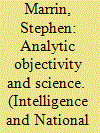

|
|
|
|
|
| Summary/Abstract |
Analytic objectivity as a standard for the US Intelligence Community appears to have been drawn from idealized conceptualizations of the scientific method as a kind of value-neutral epistemological framework used to develop knowledge “objectively.” But this embrace of objectivity provides a poor foundation for contemporary conceptualizations of the applied epistemology of intelligence analysis, as well as performance standards. Instead, intelligence analysts should embrace a more realistic goal of aspiring to but never actually achieving analytic objectivity through the reduction of subjectivity while embracing the values of honesty, neutrality, and integrity encapsulated in the phrase “calling it as you see it”.
|
|
|
|
|
|
|
|
|
|
|
|
|
|
|
|
| 2 |
ID:
171237


|
|
|
|
|
| Summary/Abstract |
This article reveals for the first time why a Nazi war criminal named Günter Ebeling who was employed by the American Counter Intelligence Corps (CIC) in occupied Germany was violently killed by British intelligence officers. Through analysis of hitherto unpublished Intelligence Division documents, it argues that existing debates concerning the post-war employment of Nazi war criminals in occupied Germany have been framed in the wrong light. Discussions concerning security and control, not morality, usually surrounded disputes regarding the employment of Nazis. Close and comparative analysis of Ebeling’s recruitment and ‘dismissal’ with that of several other Nazis demonstrates that hindsight, source limitations and a prevalent case study approach have prevented the identification of common reasoning concerning security and control which surrounded the post-war employment of war criminals in several areas of intelligence work. Indeed, new evidence suggests that the British and American intelligence services employed some Nazi war criminals in post-war Germany as part of a wider strategy of control designed to ensure the security of the occupation and pave the way for a future democratic Germany. Through the analytical prism of security and control, this article provides a synthesis between a multitude of case studies.
|
|
|
|
|
|
|
|
|
|
|
|
|
|
|
|
| 3 |
ID:
171241
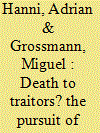

|
|
|
|
|
| Summary/Abstract |
This article argues that Russia’s use of lethal violence against intelligence defectors has to be understood as a public spectacle in which Russian leaders and intelligence officials never intended to hide their role. This “theatrical murder” functions primarily as a political signaling tool for a reasserting Russia to communicate to distinct domestic and foreign audiences. We historicize the phenomenon by outlining and explaining the KGB’s approach towards defectors during the Cold War and show that “theatrical murder” is a unique feature of Russia under Putin’s rule. The empirical findings are used to significantly advance theorizing on signaling through covert action.
|
|
|
|
|
|
|
|
|
|
|
|
|
|
|
|
| 4 |
ID:
171236


|
|
|
|
|
| Summary/Abstract |
The Canadian signals intelligence effort during the Cold War was forged in the late 1940s and 1950s with a focus on the interceptions and processing of communications from the Soviet Arctic. Canadian authorities struggled hard to build capacity for this important mission, win bureaucratic battles at home, and convince our key SIGINT partners, the US and UK, that Canada should be granted status as the controlling agency for signals intelligence against the target-rich Soviet north. The story of the origins of Canada’s Arctic SIGINT mission has remained highly classified until now.
|
|
|
|
|
|
|
|
|
|
|
|
|
|
|
|
| 5 |
ID:
171239


|
|
|
|
|
| Summary/Abstract |
Some form of legislative oversight of intelligence has become the norm in most democratic states. The near universal acceptance of the need for democratic oversight does not, however, mark the end of a process of intelligence accountability. In many states following a period of establishment and then consolidation, intelligence oversight mechanisms have begun to evolve as oversight committees have sought extra powers and developed new roles. This article examines reforms in parliamentary intelligence oversight committees in Australia, Canada, New Zealand and the UK, focusing on the form, mandate, membership, powers and resources of the committees as well as their engagement with other parliamentary actors.
|
|
|
|
|
|
|
|
|
|
|
|
|
|
|
|
| 6 |
ID:
171243
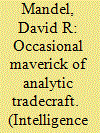

|
|
|
|
|
| Summary/Abstract |
Roughly a decade ago, in a commissioned report I wrote for the US National Research Council’s Committee on Behavioral and Social Science Research to Improve Intelligence Analysis for National Security, I characterized those rare and seminal contributors to analytic tradecraft – figures such as Sherman Kent, Jack Davis, and Richards Heuer – as mavericks.1 The term was meant to conjure a heroic image: mavericks are like mythical forces of good bursting upon an otherwise dreary set. They possess energy, brains and noble motives and act to save their communities while others around them are silent or worse. Notwithstanding those noble characteristics, I made the case for why intelligence communities should not choose or be forced to rely on the occasional maverick.
|
|
|
|
|
|
|
|
|
|
|
|
|
|
|
|
| 7 |
ID:
171240


|
|
|
|
|
| Summary/Abstract |
This article explores the enduring value of Russia’s intelligence illegals program, concluding that Russia’s urgency to employ illegals is at least as great today as it has ever been. Technological advancements have made clandestine human intelligence operations increasingly risky. Nevertheless, the Russian illegals program has overcome challenges and compromises before, and Russian leaders today continue to glorify illegals from the past and present. Consequently, for a variety of reasons – historical and practical – it is highly unlikely that Russia will replace the intelligence illegals program that it still needs today.
|
|
|
|
|
|
|
|
|
|
|
|
|
|
|
|
| 8 |
ID:
171242
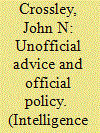

|
|
|
|
|
| Summary/Abstract |
Sir Maurice Oldfield became a Visiting Fellow at All Souls College, Oxford, when he retired from being head of MI6. No details have previously been given but recently his report to the college has been unearthed. It provides valuable insights but shows he was not a professional historian. He was looking at the interaction between unofficial advice and official policy, and picked on three key figures from before the Second World War. Comprehensive accounts of their exploits have only recently been published, significantly using material not available in 1978‒9. His choice is impressive; his judgment was astute.
|
|
|
|
|
|
|
|
|
|
|
|
|
|
|
|
| 9 |
ID:
171244
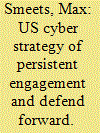

|
|
|
|
|
| Summary/Abstract |
This article evaluates the implications of U.S. cyber strategy of persistent engagement for the alliance and intelligence collection. Whilst the strategy may have benefits for certain alliance relationships, I identify four potential negative consequences; loss of allied trust, disruption allied intelligence operations and capabilities, exploitability of the strategy by adversaries, and the implementation (and justification) of persistent engagement by other countries. This paper concludes suggesting several ways forward, including the creation of a new NATO-memorandum of understanding on cyber operations.
|
|
|
|
|
|
|
|
|
|
|
|
|
|
|
|
|
|
|
|
|